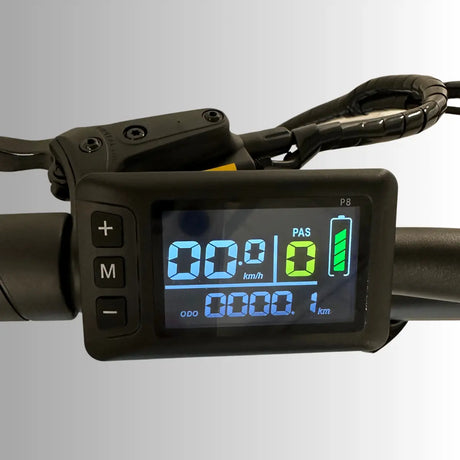With most bills still piling high, and the cost of living stabbing into every corner of the UK, you might ask: how much will it cost me to charge an electric bike? It’s smart to switch your commuting style to an eBike, right? But are you just exchanging one variety of bill for another here?
Over the past couple of years, e-bikes have surged in popularity all over Britain. Whether you’re cycling to work, to the shops or just for fun, the number of people swapping cars for bikes is steadily increasing.
So, how true is that?
We’ll explain how much you’ll pay to charge an eBike in the UK. Whether you’re planning to switch or are riding one already, you’ll have a clear sense of what to expect — and why it is, perhaps, one of the cheapest ways to ride.
How e-bikes are a Smart Financial Investment
If you’ve ever winced at the thought of filling up your car or sighed before swiping your card, you know travelling around the UK can be expensive. Petrol and public transport prices increase every year. That’s where eBikes shine.
The daily running costs of an e-bike are laughably low compared to other modes of transportation. Batteries cost pence to charge, there’s no insurance, tax, or – worst of all – expensive MOTs to worry about. (Plus, you won’t be springing for season tickets, parking fees, congestion payments or unexpected repair bills that make cars such a money pit.)
Over a year, the savings can add up — even leaving your car at home in favour of the eBike a couple of days a week. It’s not just a move with the environment in mind; it’s also a money-savvy one. If you think about it, cruising on an eBike is more rewarding.
E-Bike Charging Cost Basics
We’ll get to the exact numbers shortly, but before we do, let’s look at what you’re paying for when you charge up your eBike. Not to worry — it’s more straightforward than it sounds!
What You’re Paying For
Charging an eBike means you are filling the energy in its battery. Batteries are rated in watt-hours (Wh), or how much energy they can hold. The larger the figure, the greater the capacity — and, generally, the longer the range. The price of electricity from your house is usually charged using your watts in kilowatt-hours (kWh), where 1 kWh = 1000 Wh. So, if you have a 500Wh battery, you can use half of a kWh (0.5 kWh) for a full charge.
Typical eBike Battery Sizes
The majority of UK eBikes fit into a handful of different battery sizes:
-
250Wh (compact city bikes, lighter cyclists)
-
400Wh (perfect for daily commutes)
-
500Wh (the all-rounder)
-
750Wh (for longer rides or heavier riders)
Rough Range Estimate According To Different Types Of E-Bike Batteries
250Wh → around 20–30 miles
400Wh → around 30–50 miles
500Wh → around 40–60 miles
750Wh → up to 80+ miles
Of course, hills, wind and how much you pedal will also come into play!
The Cost of Electricity in the UK Today (2025 Update)
To calculate the cost of charging an eBike, start with what you’re paying per unit for electricity. In early 2025, the average price of electricity in the UK’s around 27p per kilowatt-hour (kWh) — not including any day ahead or forward looking surcharges caused by timing fascilities and features of certain metering above the standard meters used by most people, although this can differ slightly depending on your location and the energy supplier you’re with.
For instance, those who own homes in London and the South East tend to pay more than those in the North or Scotland. And in some places, off-peak rates are available: cheaper prices to plug into the grid during quiet hours, like overnight. If you’re on a flexible (or Economy 7) tariff, you might be charged between 17p and 20p per kWh during low-demand hours.
It’s always good to go online or check your latest bill or smart meter app to see what you’re using. However, for most people across the UK, take 27p as a rough estimate, you get a pretty good idea of what it costs to juice up your eBike at home.
How Much Does It Cost to Charge an eBike?
So with the basics out of the way, let’s go step by step to simplify things and easily calculate how much an electric bike costs in terms of charging: no headache, no gibberish, just real numbers.
Simple Step-by-Step Example
Let’s consider a 500Wh battery for our example. It is a fairly common size for e-bikes. We already know the price of electricity is around 27p per kWh in the UK. Since 500Wh = 0.5 kWh,:
0.5 kWh x 27p = 13.5p for an entire charge.
13.5p to fully ‘fuel’ your eBike’s 500Wh battery! That’s a cup of coffee or a snack at the shop!
Price for Different Battery Sizes
Well, have a look at this brief, easily readable table, where we've put 27p per kWh and its relative charging costs in most common battery capacities:
|
Battery Size |
Charge Cost |
|
250Wh |
~7p |
|
400Wh |
~11p |
|
500Wh |
~13.5p |
|
750Wh |
~20p |
It’s cheaper than buying a packet of crisps or a small chocolate bar. It is so affordable that it might even be cheaper for your commute than you spend on lunch!
How Far Can You Get for a Few Pence?
Now that we’ve established how much it costs to charge your eBike, we’ll look at how far that charge will carry you. Spoiler: Numbers are pretty amazing!
Cost Per Mile
A 500Wh battery and average charge of about 13p suggest about 40-60 miles per charge. However, it depends on terrain and riding style. It is roughly 0.27p a mile.
To give some perspective, let’s compare driving a petrol car. The average petrol in a car ranges between 12p and 20p per mile, depending on how much fuel your car needs. That’s a lot more per ride than riding an eBike. So you're having a less harmful impact on the planet and saving money too!
Reassuringly Cheap
Depending on your battery size, you can travel between 20 and 60 miles for a few pennies anywhere. And when you compare that to running a petrol car, eBikes are really cheap. Not only “cheaper than a car” — but crazy cheap for the freedom they bring.
That’s a big win-win for your wallet and the planet!
How to Save Even More on Charging
The charging cost is already low in most places, but there are ways to lower it.
Off-Peak Charging
Use electricity during off-peak hours and charge overnight. This can help you save even more on your electricity bills!
Good Battery Care Habits
Preserve your battery by not letting it get too low and charging it fully when possible. This can stretch its life and save you money on replacing it.
Tyre Pressure Maintenance
Keeping the correct amount of air in your tyres means you use energy most efficiently and get maximum range per charge. Although a small effort, it helps!
Conclusion
It’s almost too cheap to believe it, but charging an eBike costs a fraction of what you’d spend on petrol or the public transport system. In addition to the economy, eBikes are great for the environment and a healthier lifestyle. Whether you are riding to work or simply going for relaxing rides, it’s evident that transitioning to an eBike is a worthy investment.
It’s also — a point that cannot be made often enough — the smartest “fuel” choice you will ever make, for your pocket, the planet and your physical health.
If you want to learn more about e-bikes, like how do e-bikes work and when do electric bikes need servicing, subscribe to our blog and stay tuned.




































